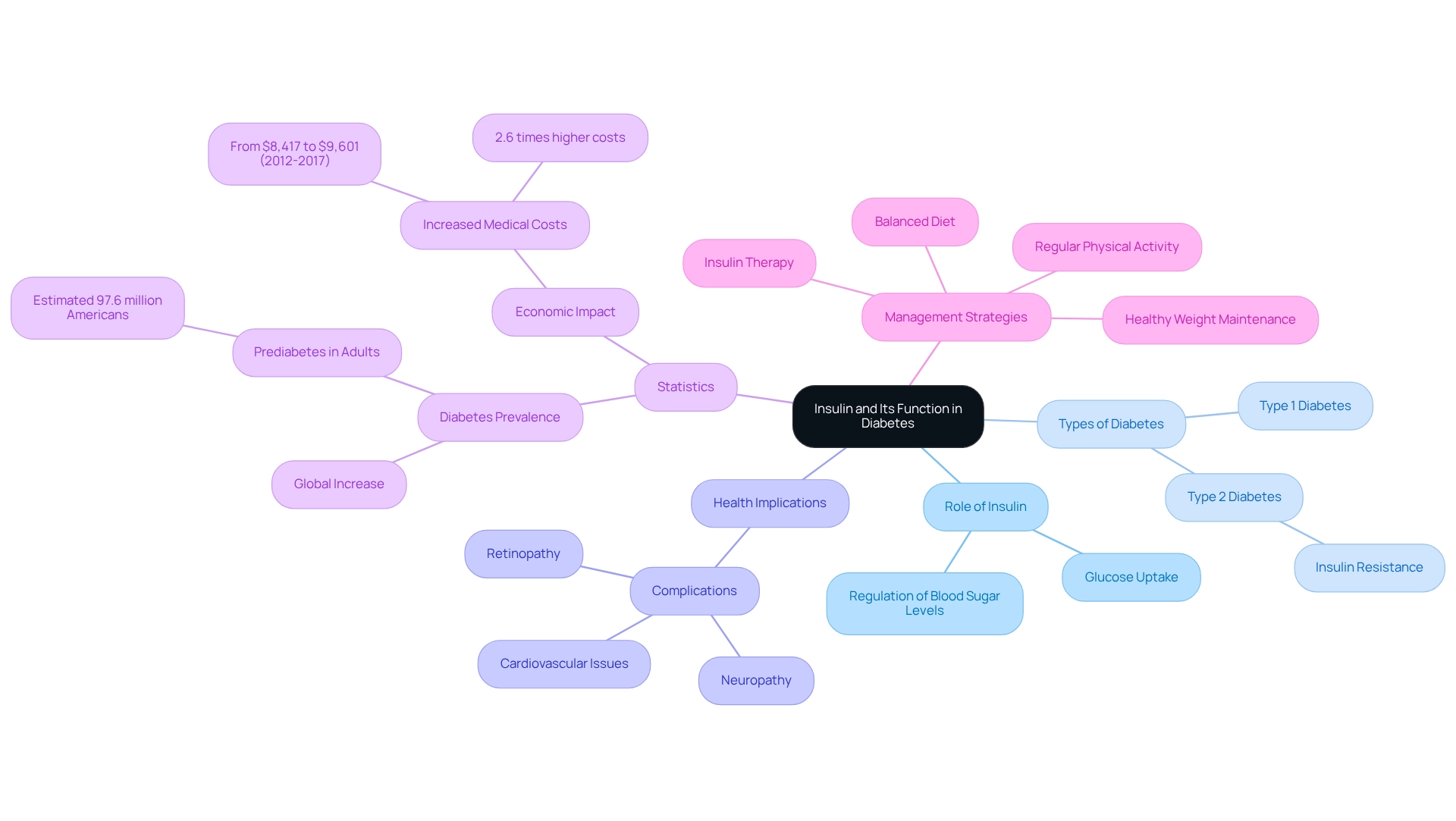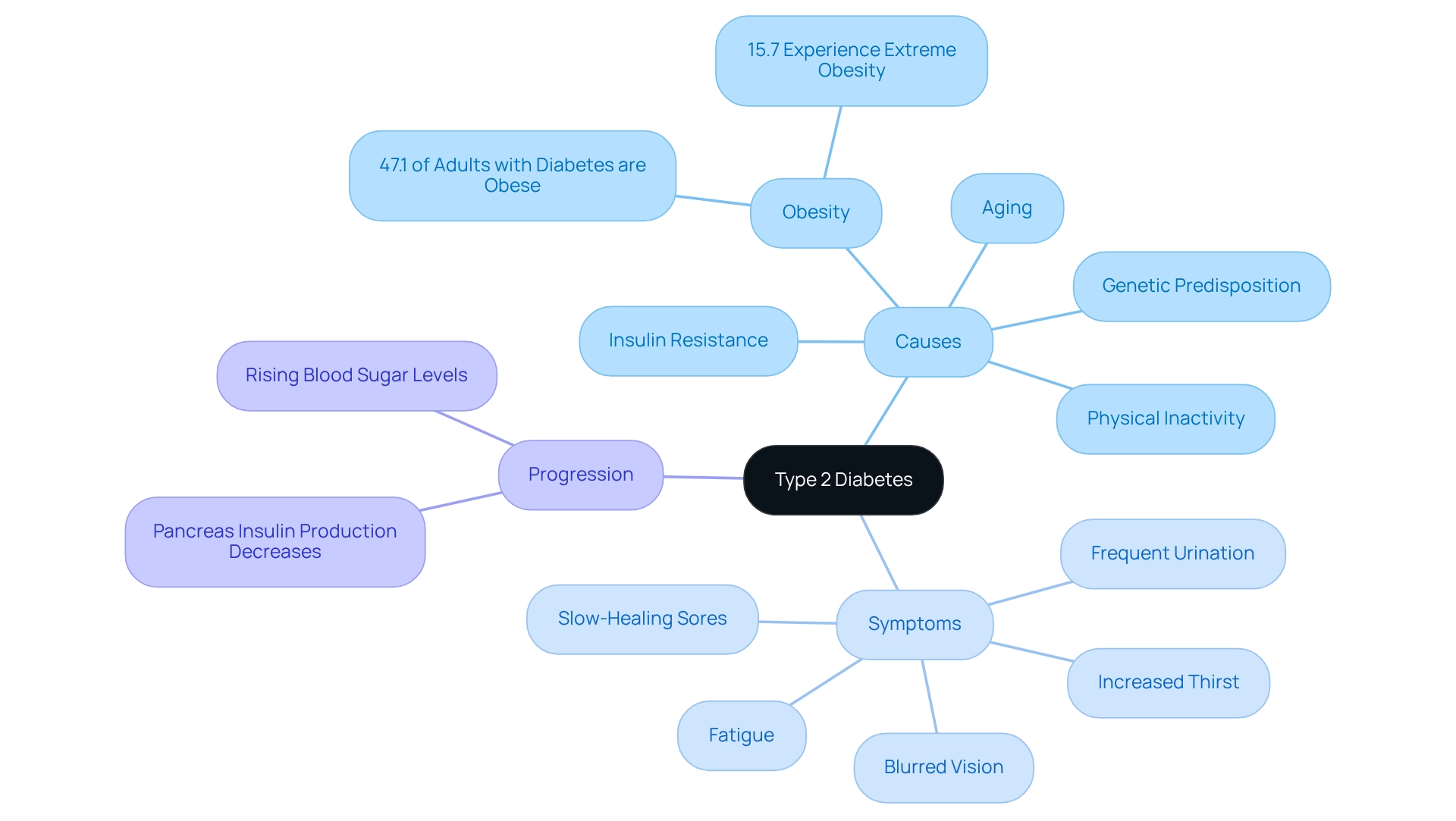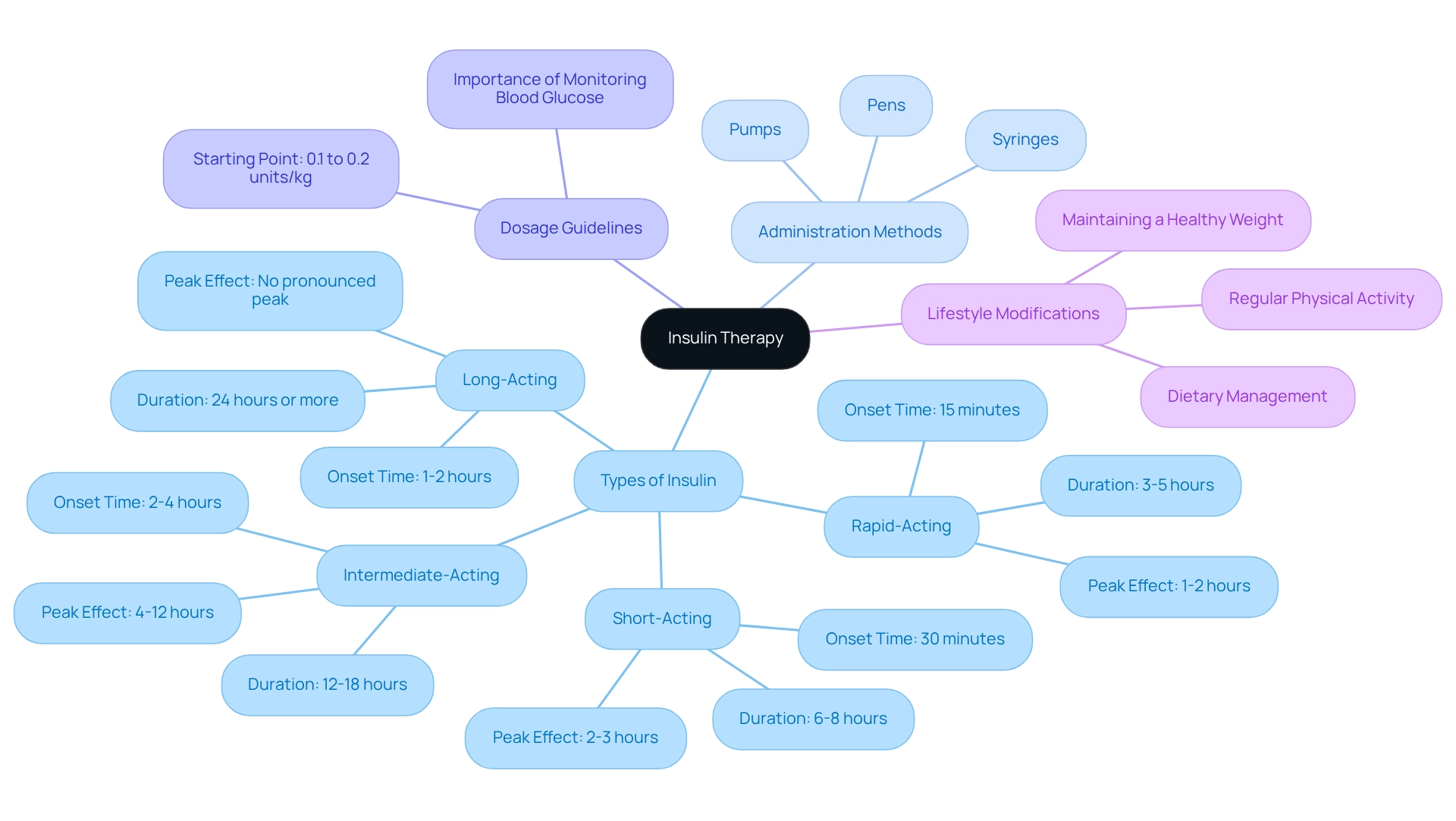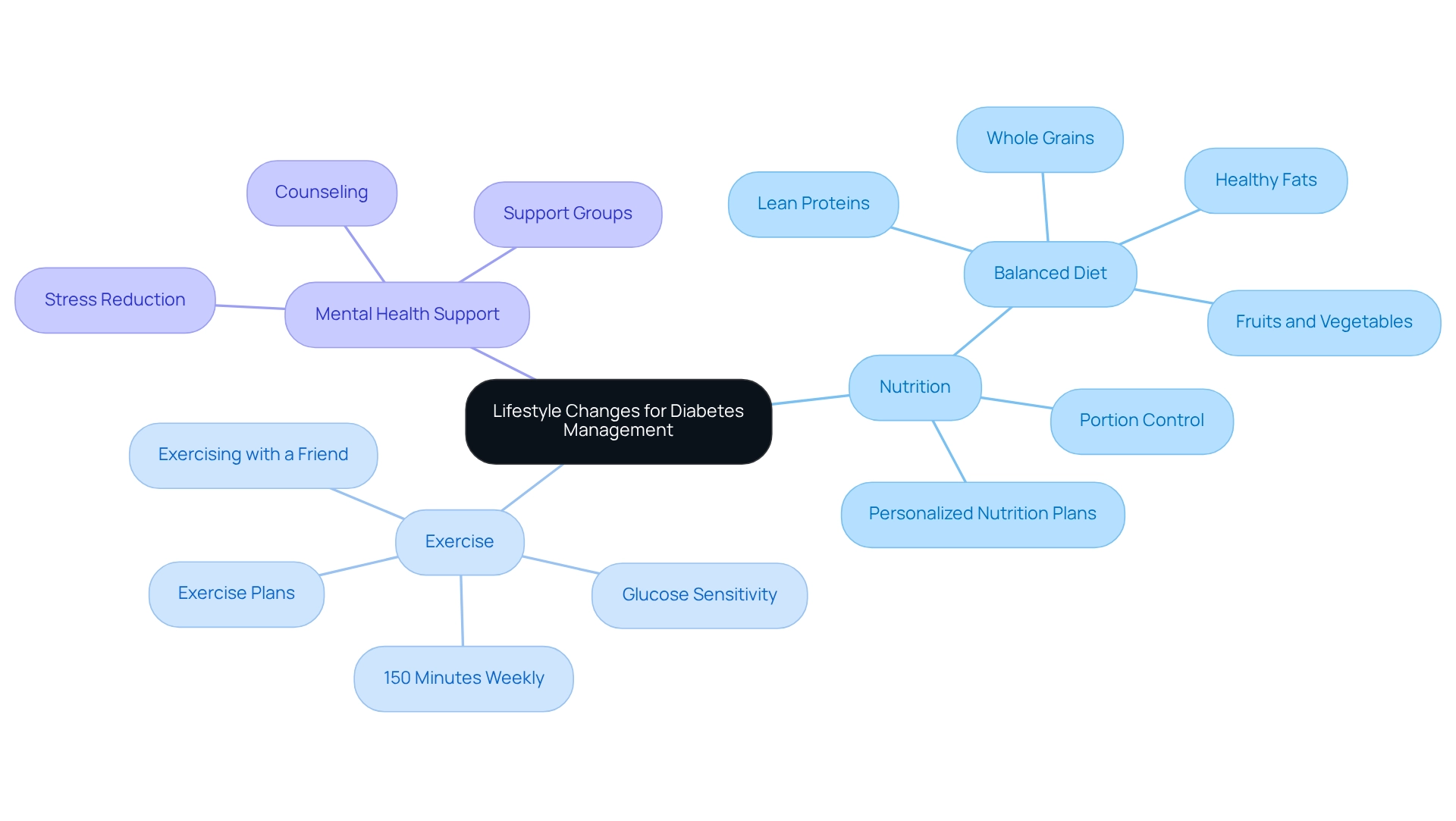Overview
This article seeks to help you understand the vital role insulin plays in managing Type 2 diabetes, while also outlining key strategies for effective management. It's important to know that insulin is crucial for regulating your blood sugar levels. Managing diabetes effectively often requires lifestyle changes, insulin therapy, and collaboration with healthcare providers. You're not alone in this journey; many people are navigating similar challenges, and there are resources available to support you.
As diabetes continues to rise, both in prevalence and economic burden, it’s understandable to feel overwhelmed. However, by making informed choices and seeking support, you can take control of your health. Remember, effective management is not just about medication; it's about a holistic approach that includes diet, exercise, and emotional well-being. We are here to support you every step of the way.
Consider reaching out to healthcare professionals who can guide you through this process. Sharing your experiences with others can also create a sense of community and connection. Together, we can work towards a healthier future.
Introduction
As the global prevalence of Type 2 diabetes continues to rise at an alarming rate, understanding the intricacies of this condition has never been more critical. It's understandable to feel overwhelmed by this reality. Insulin, a hormone produced by the pancreas, plays a pivotal role in regulating blood sugar levels. Yet, many individuals remain unaware of its significance in diabetes management. This article delves into the multifaceted nature of Type 2 diabetes, exploring the causes, symptoms, and the essential role of insulin therapy.
We will highlight the importance of lifestyle modifications, including nutrition and exercise. It's essential to remember that mental health support is also a crucial part of fostering a holistic approach to diabetes care. With projections suggesting that over 1.3 billion people could be living with diabetes by 2050, the urgency for effective management strategies is clear.
Join us on this journey toward better health as we uncover the vital elements that can empower you to take control of your diabetes and improve your quality of life. You're not alone in this journey, and we are here to support you every step of the way.
Define Insulin and Its Function in Diabetes
Insulin is a vital hormone produced by the pancreas, playing a crucial role in regulating blood sugar levels by helping glucose enter cells for energy. In this condition, the body either struggles to produce enough insulin and diabetes type 2, as seen in Type 1 diabetes, or the cells become resistant to insulin, which is typical of Type 2 diabetes. The primary function of insulin is to lower blood sugar levels by enhancing glucose uptake in muscle and fat cells while inhibiting glucose production in the liver.
At T2DSolutions, we strive to be a comprehensive resource for individuals managing Type 2 diabetes. Understanding the function of insulin is essential for effectively controlling blood sugar levels. This knowledge helps individuals recognize the importance of maintaining balanced glucose levels to prevent complications such as neuropathy, retinopathy, and cardiovascular issues. Recent research highlights that insulin and diabetes type 2 are significantly affected by insulin resistance, which contributes to the progression of the disease. Studies indicate that maintaining a healthy weight, following a balanced diet, and engaging in regular physical activity can help prevent or delay its onset.
Alarmingly, global cases of diabetes have surged four-fold in recent decades, underscoring the urgent need for effective strategies. Statistics reveal that the average medical costs for individuals with diagnosed diabetes-related complications are 2.6 times higher than for those without the condition, illustrating the financial burden of managing diabetes. From 2012 to 2017, additional medical expenses per individual linked to diabetes rose from $8,417 to $9,601, emphasizing the growing economic impact of this illness. Moreover, forecasts suggest that by 2050, over 1.3 billion people will be living with diabetes, highlighting the critical need for immediate action to address this escalating health crisis, and real-world experiences demonstrate the success of insulin and diabetes type 2 management through insulin therapy. It is vital for patients to collaborate with healthcare providers to tailor treatment strategies that meet their unique needs. According to the Centers for Disease Control and Prevention, approximately 97.6 million Americans aged 18 or older are estimated to have prediabetes, representing about 38% of the adult population. This statistic emphasizes the importance of understanding the role of insulin and diabetes type 2 in prevention and management. By fostering a deeper understanding of insulin's function, individuals can make informed decisions about their health and improve their quality of life. Remember, you are not alone in this journey; T2DSolutions is here to support you with resources and guidance to help you manage your condition effectively.

Explore Type 2 Diabetes: Causes, Symptoms, and Progression
Type 2 diabetes primarily arises from resistance to insulin and diabetes type 2, a condition where the body's cells struggle to respond effectively to this hormone. Factors such as obesity, physical inactivity, genetic predisposition, and advancing age can worsen this resistance. It's concerning to note that 47.1% of adults with Type 2 diabetes also face obesity, while 15.7% experience extreme obesity. This highlights a significant connection between weight and the risk of developing this condition.
Common symptoms of Type 2 diabetes include increased thirst, frequent urination, fatigue, blurred vision, and slow-healing sores. As the disease progresses, the pancreas may produce less insulin and diabetes type 2, which leads to higher blood sugar levels. Understanding these signs is crucial for patients, as early recognition can facilitate timely medical intervention and better outcomes.
Recent projections indicate a troubling trend in the prevalence of Type 2 diabetes. Without substantial changes in public health strategies, the burden of this condition may continue to rise. In South Africa, the reported burden stands at 1374 DALYs per 100,000, underscoring the urgent need for effective management and preventive strategies. This situation emphasizes the importance of healthcare providers collaborating efficiently and having the necessary resources to educate and support patients.
Real-life experiences illustrate the progression of Type 2 diabetes, highlighting the critical need for lifestyle changes and ongoing monitoring. Engaging with health educators can provide invaluable support and guidance, empowering individuals to successfully navigate their wellness journey. As one specialist noted, 'Whether you were just diagnosed or have had the illness for some time, meeting with an educator for support and guidance is a great idea.' By fostering an understanding of the causes and symptoms of Type 2 diabetes, patients can take proactive steps toward managing their condition and improving their quality of life.
Moreover, the rising medical costs associated with Type 2 diabetes, which increased from $10,179 to $12,022 per individual between 2012 and 2022, highlight the financial implications of managing this illness. This underscores the critical need for public policies and funding for disease prevention initiatives to address the growing prevalence of this health condition. Remember, you're not alone in this journey; we are here to support you every step of the way.

Implement Insulin Therapy: Types, Administration, and Dosage Guidelines
When lifestyle modifications and oral medications fail to adequately control blood sugar levels, insulin and diabetes type 2 therapy becomes essential for individuals. At T2DSolutions, we understand how overwhelming this diagnosis can be, and we offer significant resources for recently diagnosed patients. Our educational materials and community support are designed to assist you in managing your therapy effectively.
There are various types of insulin available, including rapid-acting, short-acting, intermediate-acting, and long-acting varieties. Each type has distinct onset times, peak effects, and durations of action. For instance, rapid-acting insulin begins to work within 15 minutes and is typically administered before meals to help control postprandial blood sugar spikes. You can choose from different administration techniques, such as syringes, pens, and pumps, allowing for flexibility that suits your lifestyle.
Dosage guidelines are tailored to individual needs, with a common starting point ranging from 0.1 to 0.2 units per kilogram of body weight. It's crucial to observe your blood glucose levels regularly, as this will help you modify your dosage efficiently and ensure optimal glycemic control.
Current recommendations from health organizations emphasize the importance of personalized regimens, considering factors such as age, weight, activity level, and overall health. Recent statistics indicate that the use of insulin and diabetes type 2 therapy among individuals has increased, underscoring its vital role in the holistic care of this condition. Additionally, new formulations, like ultra-rapid insulin, are being developed to enhance both efficacy and convenience.
As highlighted by the CDC, Type 2 diabetes is becoming more prevalent around puberty, making effective management strategies essential. The financial implications of blood sugar management are significant, with the average medical expenses per individual rising from $8,417 in 2012 to $9,601 in 2017. This statistic underscores the importance of effective insulin and diabetes type 2 therapy in managing your health, with practical examples illustrating how tailored dosage guidelines can lead to improved health outcomes. Health specialists agree that combining insulin and diabetes type 2 therapy with lifestyle modifications—such as regular physical activity, which is vital according to Harvard Health—and dietary control can greatly enhance your overall management of the condition and improve your quality of life. Furthermore, case studies focusing on preventive measures for blood sugar conditions show that maintaining a healthy weight and adhering to dietary guidelines are essential strategies to prevent or delay the onset of Type 2 diabetes. This reinforces the holistic approach that T2DSolutions is committed to promoting.
You're not alone in this journey. We are here to support you every step of the way.

Adopt Lifestyle Changes: Nutrition, Exercise, and Mental Health Support
Embracing a healthy lifestyle is essential for effectively managing insulin and diabetes type 2 conditions, and T2DSolutions is here to support you on this journey. Nutrition serves as a cornerstone of this approach; prioritizing a balanced diet that includes whole grains, lean proteins, healthy fats, and a wealth of fruits and vegetables is vital. It's important to practice portion control and carbohydrate counting as strategies for regulating blood sugar levels. Recent studies indicate that dietary patterns significantly influence blood sugar control, especially concerning insulin and diabetes type 2, and the effectiveness of these patterns varies, necessitating personalized strategies for T2DM care. At T2DSolutions, we offer tailored nutrition plans and resources to empower you in making informed dietary choices.
Regular physical activity is equally crucial. Current recommendations suggest aiming for at least 150 minutes of moderate-intensity exercise each week. Engaging in physical activity not only enhances sensitivity to glucose but also aids in weight management. Exercising with a friend can boost motivation and accountability, as recent findings emphasize, making it easier to maintain a consistent routine. T2DSolutions provides guidance on creating an effective exercise plan that aligns with your lifestyle. Additionally, for individuals managing insulin and diabetes type 2, increasing physical activity may require adjustments in insulin dosing, particularly lowering premeal bolus doses of rapid-acting insulin to prevent hypoglycemia.
Psychological support plays a vital role as well. The emotional burden of managing a chronic condition can lead to stress, anxiety, and depression. Incorporating stress-reducing activities, seeking counseling, and connecting with support groups can significantly enhance your emotional well-being and improve overall health management. T2DSolutions encourages you to explore mental health resources and community support, fostering a comprehensive approach to managing your condition.
Real-world examples demonstrate that individuals who embrace these lifestyle changes often experience improved health outcomes, underscoring the effectiveness of a well-rounded strategy in managing Type 2. Furthermore, organizations like the American Heart Association highlight that low-fat diets, particularly Mediterranean or vegetarian dietary patterns, are essential for adjusting fat and fiber consumption, further emphasizing the need for tailored nutrition plans. With T2DSolutions, you have access to a comprehensive resource hub dedicated to your diabetes management needs.

Conclusion
Managing Type 2 diabetes can feel overwhelming, but it's important to remember that you're not alone in this journey. Understanding the critical role of insulin, the causes and symptoms of the condition, and effective management strategies is essential. Insulin helps regulate blood sugar levels, and when lifestyle changes and oral medications aren't enough, insulin therapy becomes necessary. Recognizing the symptoms of Type 2 diabetes, along with underlying causes like insulin resistance and obesity, can lead to timely interventions and better health outcomes.
Implementing lifestyle changes, such as balanced nutrition and regular physical activity, can significantly enhance your diabetes management. Tailored dietary plans and consistent exercise routines not only improve insulin sensitivity but also contribute to your overall well-being. It's also vital to address mental health, as the emotional challenges of living with diabetes can impact your ability to manage the condition effectively.
As the prevalence of Type 2 diabetes continues to rise, the need for effective management strategies becomes increasingly urgent. Projections indicate a staggering increase in diabetes cases by 2050, making it essential to empower individuals with knowledge and resources. With support from organizations like T2DSolutions, you can navigate your diabetes journey with confidence, making informed decisions that lead to improved health and quality of life. Remember, we are here to support you every step of the way.
Frequently Asked Questions
What is the role of insulin in the body?
Insulin is a vital hormone produced by the pancreas that regulates blood sugar levels by helping glucose enter cells for energy. Its primary function is to lower blood sugar levels by enhancing glucose uptake in muscle and fat cells while inhibiting glucose production in the liver.
How does insulin resistance relate to Type 2 diabetes?
In Type 2 diabetes, the body may become resistant to insulin, meaning that cells do not respond effectively to the hormone. This resistance contributes to the progression of the disease and complicates blood sugar regulation.
What are the potential complications of unmanaged blood sugar levels?
Poorly managed blood sugar levels can lead to complications such as neuropathy (nerve damage), retinopathy (eye damage), and cardiovascular issues.
What lifestyle changes can help manage or prevent Type 2 diabetes?
Maintaining a healthy weight, following a balanced diet, and engaging in regular physical activity can help prevent or delay the onset of Type 2 diabetes.
How has the prevalence of diabetes changed in recent decades?
Global cases of diabetes have surged four-fold in recent decades, highlighting the urgent need for effective management strategies.
What is the economic impact of diabetes on individuals?
The average medical costs for individuals with diagnosed diabetes-related complications are 2.6 times higher than for those without the condition. From 2012 to 2017, additional medical expenses linked to diabetes rose from $8,417 to $9,601 per individual.
What is the projected future prevalence of diabetes?
Forecasts suggest that by 2050, over 1.3 billion people will be living with diabetes, indicating a critical need for immediate action to address this health crisis.
How many Americans are estimated to have prediabetes?
Approximately 97.6 million Americans aged 18 or older are estimated to have prediabetes, representing about 38% of the adult population.
How can individuals improve their understanding of insulin and diabetes management?
By fostering a deeper understanding of insulin's function and the implications of diabetes, individuals can make informed decisions about their health and improve their quality of life. T2DSolutions offers resources and guidance to support effective management of the condition.



